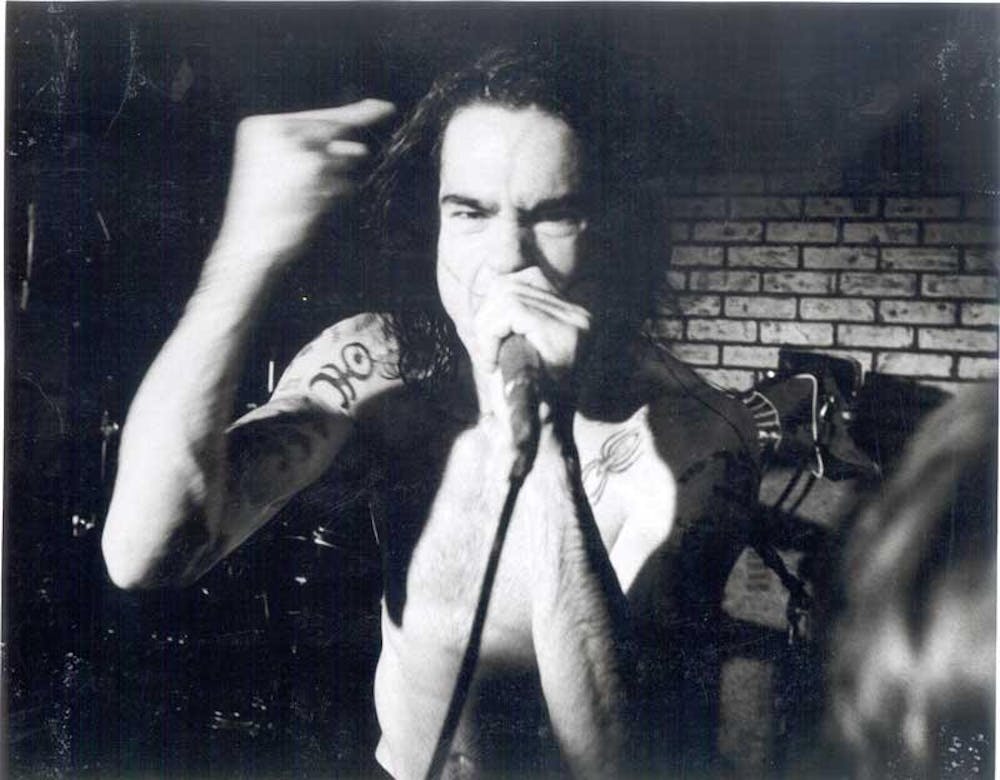The Untold History of Punk Rock in Mount Pleasant
It’s 1985. There are about 150 kids lined up outside the local rock bar, Tom's Foolery. They have been waiting all week for this show.
They are about to have a life-changing experience: witnessing the raw fury of America's most powerful punk act, Black Flag.
In fact, Black Flag — fronted by musician, actor and spoken word artist Henry Rollins — played the downtown Mount Pleasant venue, now called Rubbles, twice in the 1980s.
“I was amazed I was seeing a show like that in Mount Pleasant,” said David Ginsburg, a former librarian at Central Michigan University, who was at the first show.
The California-based band wasn't the only alternative music icon that played at the bar. The venue, which today serves as a launching pad for a new generation of bands, has a long history of hosting punk and alternative musicians from all over the country. Ska-based party bands and bands with raw, hardcore fury all graced the building's foot high stage.
Black Flag

Rollins screaming at a Tom's Foolery show in 1985.
Mount Pleasant has a fairly long history with punk rock and alternative music. Perhaps the city's most notable punk rock moments were the two Black Flag shows performed by the legendary hardcore band on July 18, 1985 and June 25, 1986.
The show in 1985 is noteworthy because the band performed twice that day. The daytime performance was an all-ages show, with a 21 and over show in the evening – although that didn’t stop some underage fans from attending. The crowd estimate ranges from 100 to about 250 people for each show. The bar's capacity is 150 people.
“It was well overcapacity,” said Chris Goosman, a former soundman and Foolery regular. “I’m sure if the fire marshal had come that night, they would have shut the place down.”
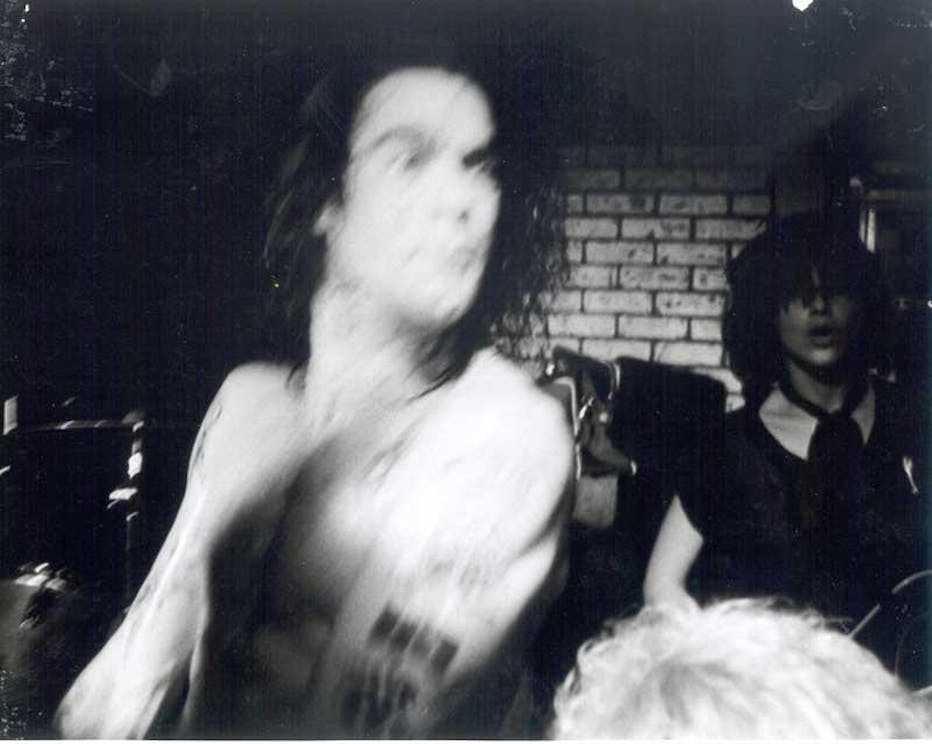
Rollins going insane with the crowd at a Tom's Foolery show in 1985.
People from all over the state attended the shows. It was unthinkable for local punks and alternative music fans that the band traveled all the way from Los Angeles to Central Michigan. There was slam-dancing. There were mosh pits. These kids and outcasts got to see their idols close up – to be screamed at and sweated on by Rollins and company.
“It was the loudest show I had ever been to — period," Goosman said.
Even before they took the stage for their first show, the members of Black Flag made their presence felt downtown. The band stayed the night in the apartment located above the bar. Many people, including Goosman and Ginsburg, saw Rollins hanging out in front of Foolery before the show.
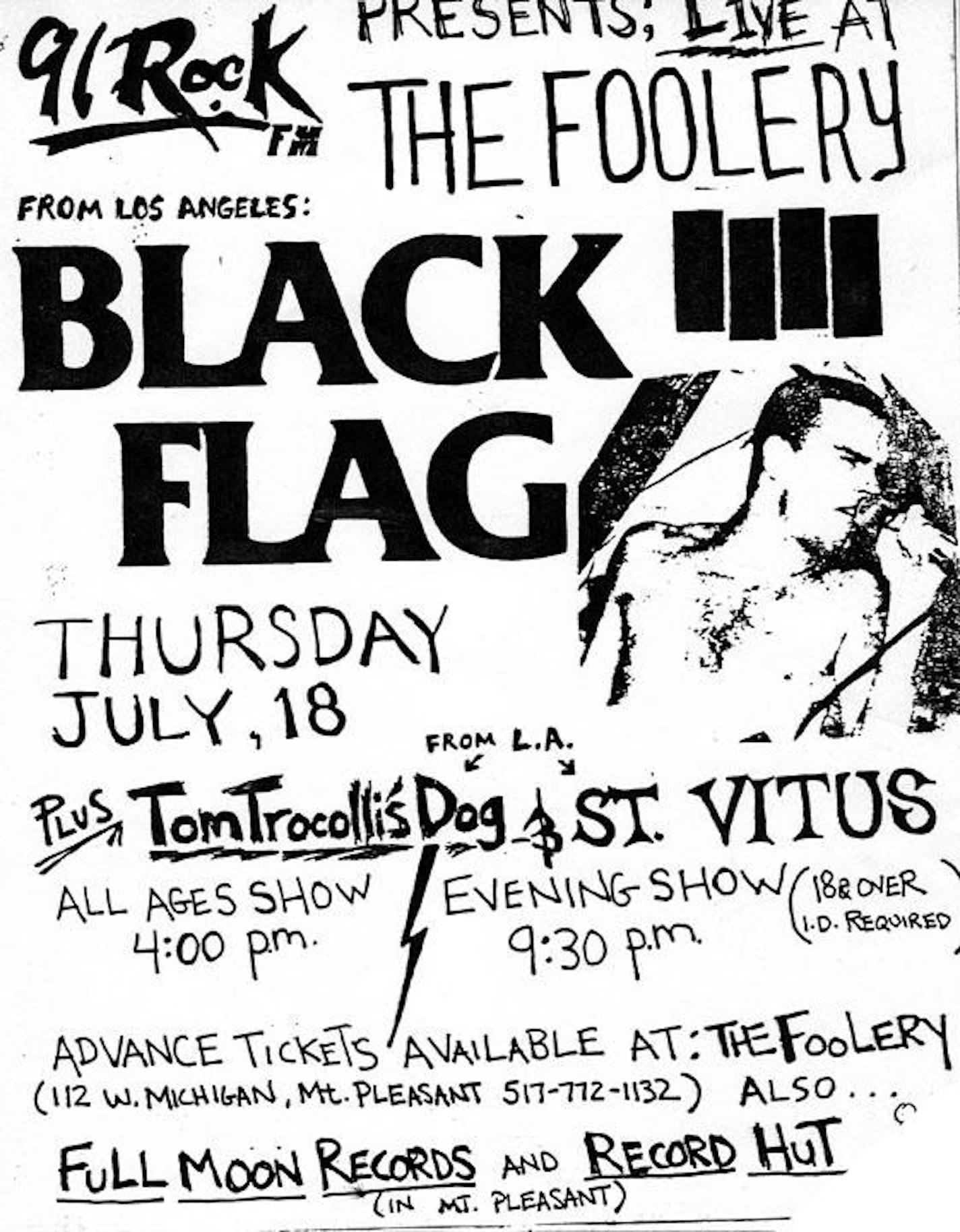
Flyer for a 1985 Black Flag show.
John Gonzalez of the Grand Rapids Press, who was a reporter for Central Michigan Life, interviewed Rollins to promote the 1985 show. At the time, Rollins had a reputation for being an intimidating nightmare for unprepared interviewers. While Gonzalez had only dealt with Rollins over the phone, the music journalist said it was still a challenge.
“For the first 15 minutes (of the interview), I was trying to figure out if he was speaking English,” Gonzalez said. “He was going a mile-a-minute. Then he would suddenly stop and not say anything."
Rollins invited Gonzalez to say hello the day of the concert. Gonzalez arrived that day to find an intense, focused Rollins writing in his notebook. Gonzalez said the singer appeared to be "in his own bubble" and decided it would be wiser to not disturb Rollins. He did say hello after the performance.
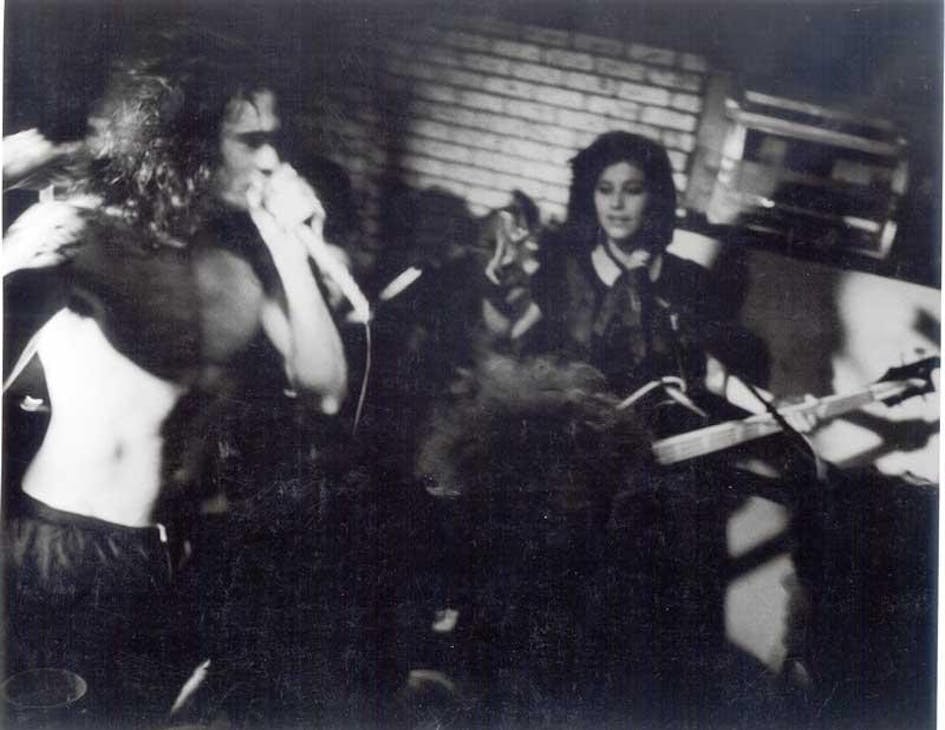
Black Flag performing at Tom's Foolery in 1985.
The 1986 Mount Pleasant show was historic. It was the third-to-last show Black Flag played before they broke up and was one of the last performances Rollins played with Black Flag. The hostility between the band members was noticed by some in the crowd.
“You could tell there was tension between the band," said Roger Hitts, a former CM Life entertainment reporter who attended both shows. “They seemed to have less joy being on that stage.”
The band would go on to play two more shows — Ann Arbor and Detroit.
Black Flag disbanded in August 1986.
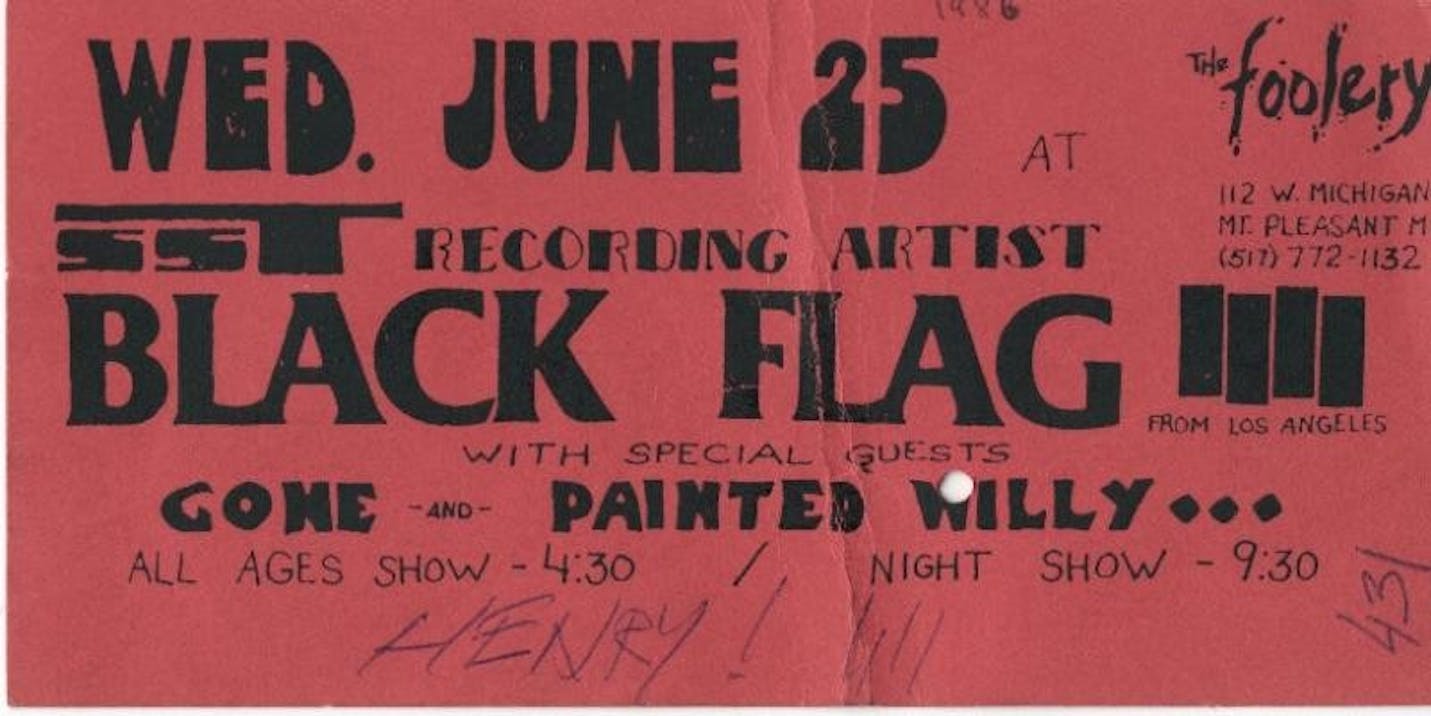
Ticket for the 1986 Black Flag show at Tom's Foolery.
Tom’s Foolery
While the bar may never have pulled in another act as big as Black Flag was when they performed there at the height of their popularity, Tom’s Foolery still had an impressive list of names that rocked there during the ‘80s. In fact, this was the place to see punk and alternative bands in Mount Pleasant. While the bar did host bands that were not considered “punk”, if a noteworthy band from those genres was going to play in Mount Pleasant, it was probably going to be at the Foolery.
“Those (punks) lived at The Foolery,” said 1990 alumnus Tony Bittick.
The person who brought these bands to Central Michigan was Harvey Venier. At an early age, the Sault Ste. Marie native developed a love of music. That interest grew to a devotion to punk and hardcore music.
After attending the University of Michigan, Venier returned to Sault Ste. Marie. While working at a bar there, he developed an interest in owning his own establishment that hosted live music.
“I was never interested in getting into the bar business at a place that was just liquor, or just liquor and food,” Venier said. “My interest was having a place where we could put on shows.”
He and friends went searching throughout Michigan for a bar to buy. Since this bar would be hosting "more hip" bands, they knew it had to be in Detroit or a college town. Eventually, he settled on buying The Foolery in Mount Pleasant. He took ownership of the bar in 1984.
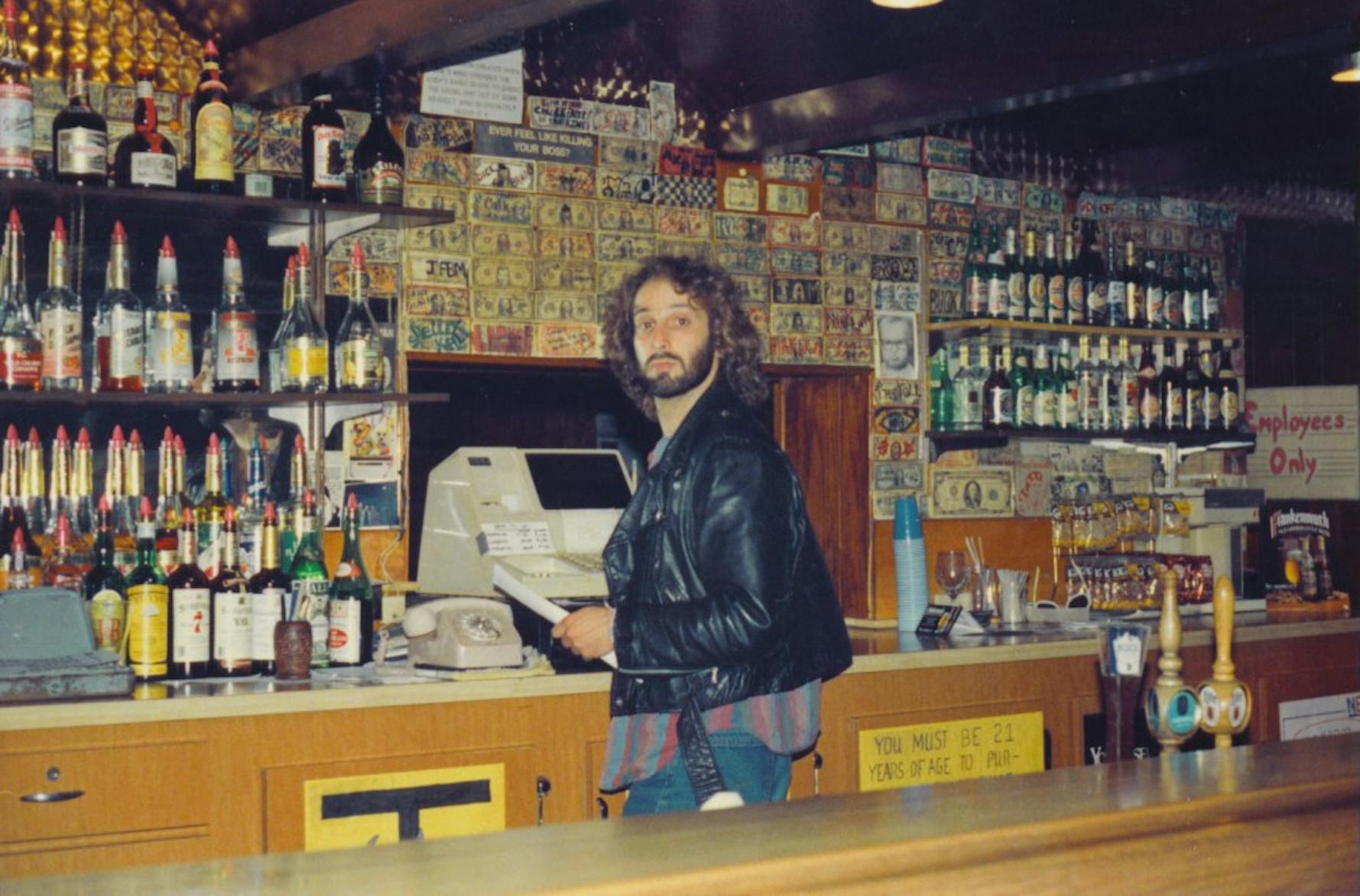
Harvey Venier tending the bar at the Tom's Foolery in the 1980s.
Venier began booking punk, hardcore and alternative acts right away, including drawing interest from national artists. The new bar owner realized there were castaways in town who needed a place to call their own. The Foolery could provide them with a place they could feel was their's, Venier believed, while he supported the musicians he liked.
“It was this oasis, in the middle of a cultural desert,” Goosman said.
Birth of Alternative Rock
The Foolery boasted a surprising number of up-and-coming bands that eventually became well-known to fans of college radio and MTV's "120 Minutes."
The Flaming Lips played its first Foolery show in January 1988, which was bad timing for the Oklahoma natives. On the way to Mount Pleasant, the band's tour bus broke down and they drove through a "nasty blizzard," said Steve Scherer, a Foolery regular and former CMU faculty member, arriving a couple of hours late.
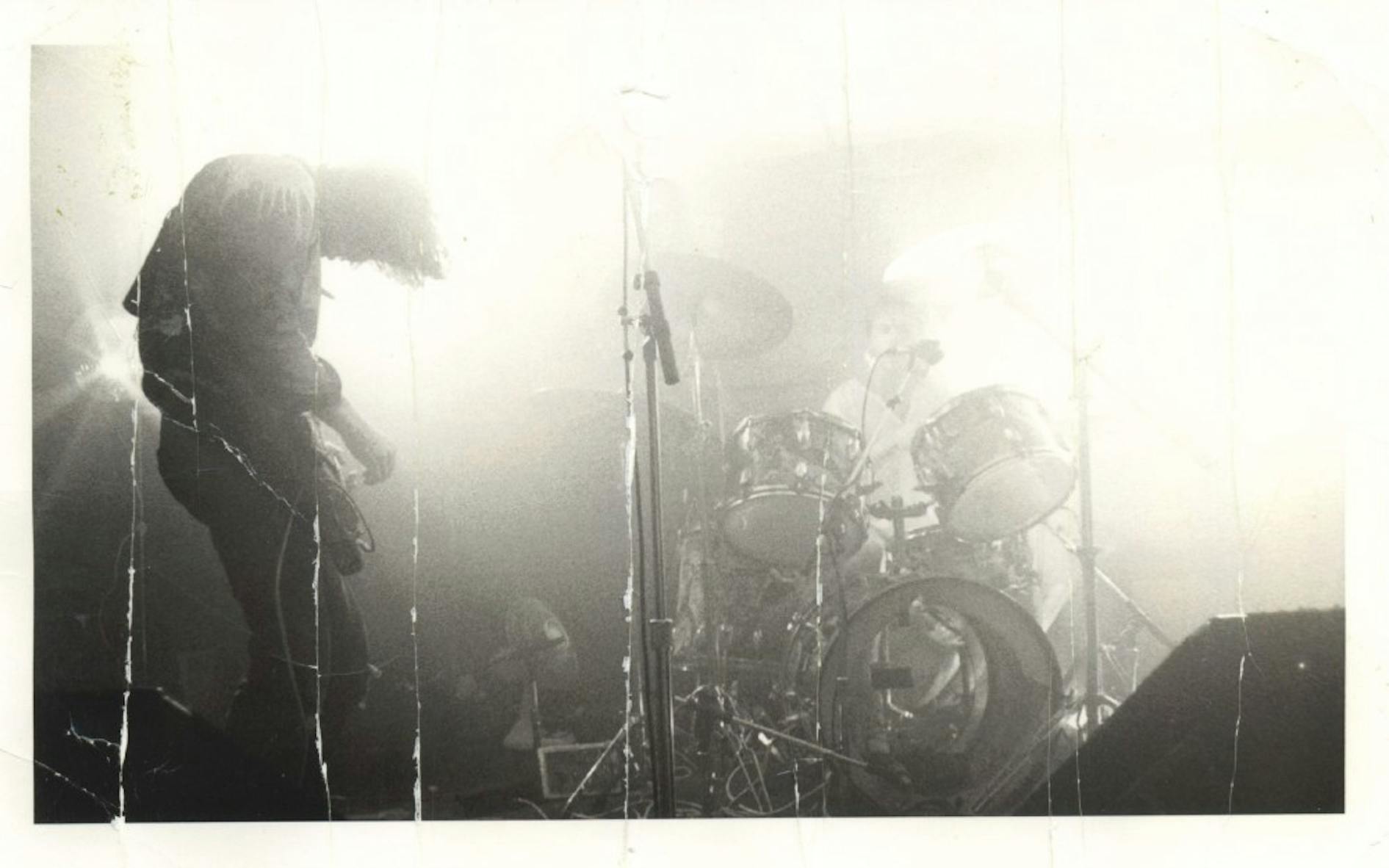
The Flaming Lips performing in front of their signature light show in 1988 at Tom's Foolery.
By his account, many people who went to see The Flaming Lips didn’t even know who they were. Because they showed up late, the band had to quickly set up their light show. But once they were finished, everyone in the crowd left impressed.
“I was rather astonished at them,” Scherer said.
Before they appeared on "Saturday Night Live" in 1991, the six-piece L.A. group Fishbone appeared at Foolery. The group pioneered a ska (a genre started in Jamaica that influenced reggae and rocksteady), punk and funk sound that later went on to inspire many other alternative bands such as the Red Hot Chili Peppers. They played frantic, high-energy sets in 1985 that kept kids in the crowd dancing the entire time.
“People’s jaws just dropped,” Hitts said. “People really didn’t know their music, (but) they were just the biggest party band.”
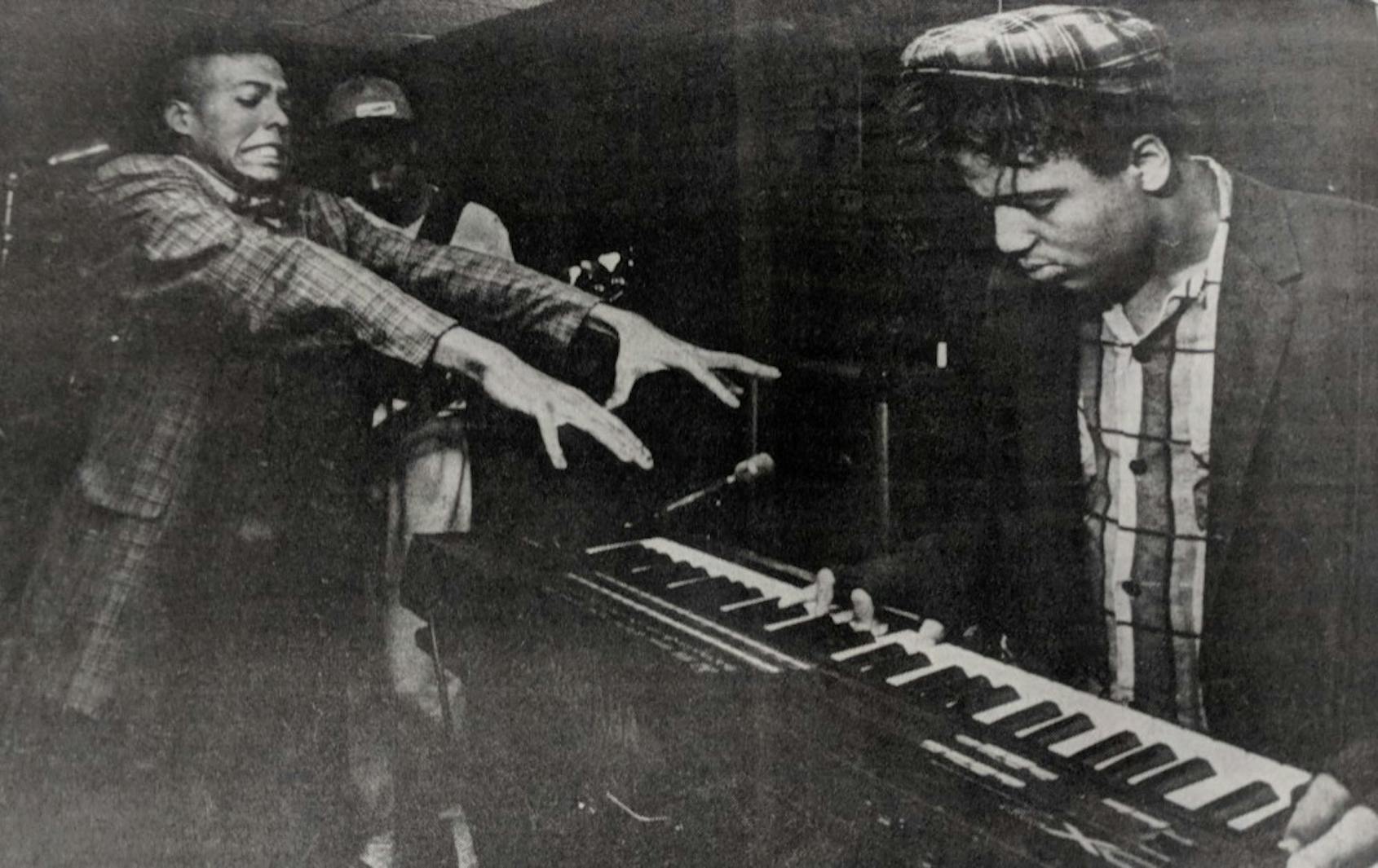
Fishbone playing a show in October of 1985 at the Foolery
Alternative rock band Soul Asylum played at the Foolery before they became famous in 1993 with their hit single, "Runaway Train." Venier and Goosman recalled them putting on a lively, much rawer performance.
"They had all the musical chops; that was obvious later when they became more mainstream," Venier said. "But they were a lot harder, rawer, faster."
Hitts however, had a more wild time after the concert. He remembers inviting lead-singer, Dave Pirner, back to his apartment after the show because they were interested in having a few more drinks. When they realized they were locked out, Pirner decided he would do his part to keep the evening going.
"Pirner scales the building (and) gets up onto the roof. I'm standing outside my door, locked out, while he jumps through my skylight," Hitts said. "He unlocks the door, he's got blood dripping down his arm (and) he's holding a half-gallon of Southern Comfort I had in the living room." He and Pirner then kept the good times going at a college party afterward.
Music fans like Hitts were able to meet some of their favorite bands thanks to The Foolery. Some other notable performers include:

The Dead Milkmen rocking out at Tom's Foolery in 1987.
- Dead Milkmen
- Afghan Whigs
- Meat Puppets
- The Crucifucks
- The Toll
But as all CMU students know, every great party must come to an end.
In late 1989, Venier was forced to sell the bar due to financial difficulties. Less than a decade after he purchased it, it was last call at Tom's Foolery.
Rubbles and Workhorse Movement
Tom Minelli purchased the business and renamed the bar "Rubbles." Foolery regulars say they felt betrayed — they felt that the bar was something special that was taken away from them. Minelli started booking more bands that were a stark contrast from the punk and alternative acts that built the bar's legend and wasn't bringing in nationally-recognized bands as often as the Foolery did. Rubbles instead put more of an emphasis on local and regional bands. Before they got national recognition, Michigan locals Sponge, Mustard Plug, and The Suicide Machines played at Rubbles in the 1990s.
For Mount Pleasant, the most significant local band to play was Workhorse Movement. An alternative-metal act inspired by bands like Clutch, Workhorse was formed by four CMU students in the mid-'90s.
"When we started (playing) Detroit and Chicago, there were people who were (CMU) graduates, people coming back home, so it kind of spread from Central," said Matthew Kozuch, former frontman for the Workhorse Movement, and 1996 CMU alumnus. "We got our record deals 100 percent out of CMU crowds."
When Workhorse first started, Kozuch said there was a lively music scene in Mount Pleasant. Workhorse Movement played alongside groove-based bands like Botfly and funk-based band Bent Lucy. He recalled lines of eager concert-goers that would wrap around Main Street waiting to get into Rubbles. There, the bar would go well beyond capacity, and things would get a little "hazy." To Kozuch, this reminded him of the alternative and grunge scene from early '90s Seattle.
"At the time, Mount Pleasant was as close to what going on in Seattle as you could get," Kozuch said.
It was dirty, dim, and the place always rocked.
"We would leave after a show, and there wouldn't be any ceiling tiles left," Kozuch said.
(Footage of the Workhorse Movement playing at Rubbles during the '90s.)
For Kozuch, the most memorable Rubbles show wasn't Sponge or himself playing on stage – it was witnessing a fiery performance by a KISS tribute band. The band was accurate, meaning they had full-pyrotechnics inside the small, wooden building.
"The ceiling caught on fire," Kozuch said. "There were hundreds of people jammed in there and nobody could move."
Everyone had to evacuate the building, though the band proceeded to finish their set.
Workhorse Movement eventually moved to Detroit, where they signed to local label, Overcore. They released a self-titled E.P. and were then signed to the famed metal label, Roadrunner Records, the same company that also included Mercyful Fate, Slipknot, Biohazard and Madball. In 2000, the band released its album, "Sons of the Pioneers."
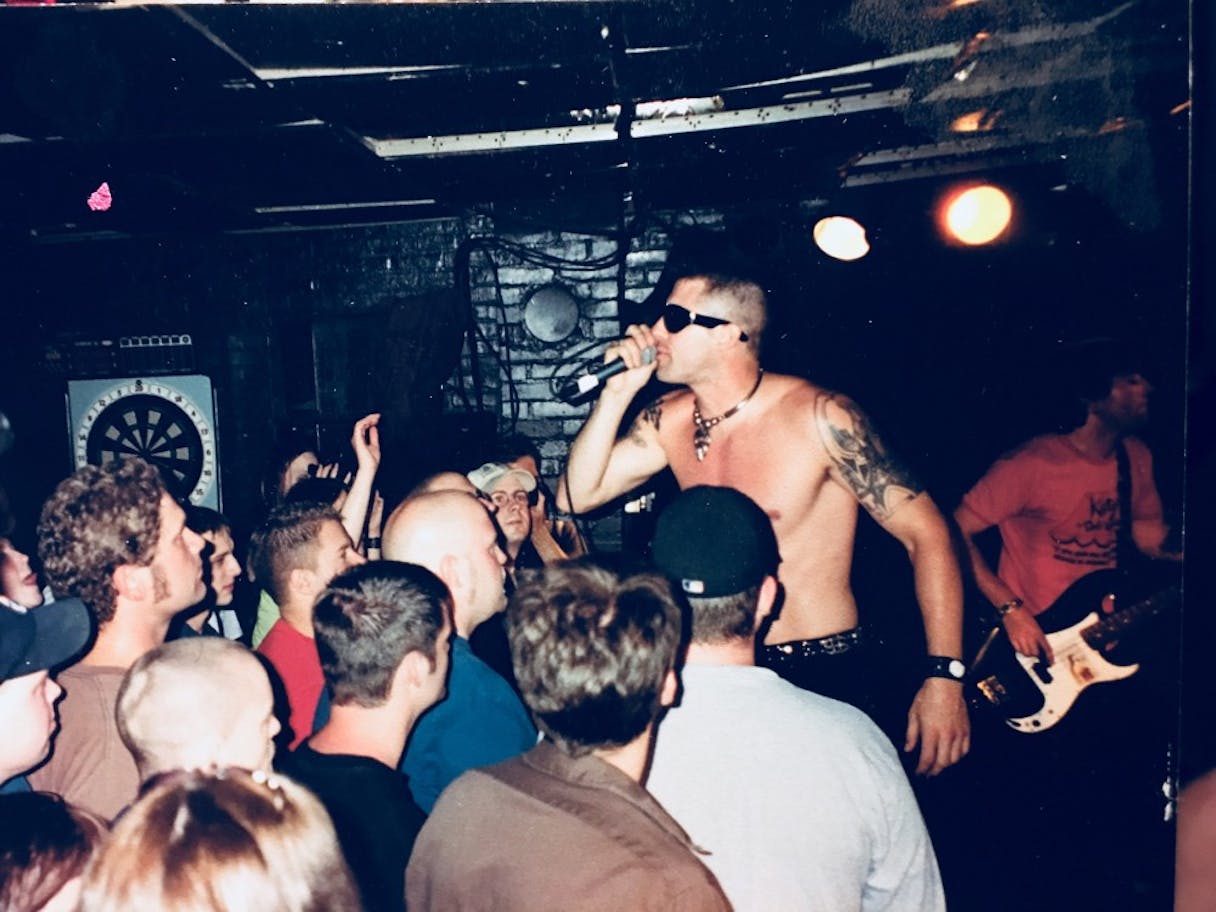
Matt Kozuch playing with the Dirty Americans in 2001.
“It’s frustrating that they took a look at this before (and said) it doesn’t have a federal interest,” he said. “I would think the federal navigation channel, it would be a federal interest. But I get it. They’re saying that shoreline and boat damage are not federal interests.”
Workhorse Movement toured and performed with Slayer, Green Day, Metallica and Slipknot. The band supported Disturbed on its first major tour when "The Sickness" became a national phenomenon.
In late 2000, Workhorse played its last show in Detroit. They broke up the next morning.
From the ashes of Workhorse came the Dirty Americans, a blues-rock band once again fronted by Kozuch, and features most of the members from Workhorse Movement. The Dirty American have played Rubbles in the past, as recently as 2012.
Rubbles: The Same House of Rock Music
Mostly unchanged from its most recent bit of remodeling — in 1989 — Rubbles remains a popular downtown venue for live music. The walls are caked with stickers from bands that have played there. Promoters still bring in punk bands from time to time as well as alternative, classic and southern rock bands.
As recently as 2007, Sponge returned to perform at the bar. Mustard Plug came back in 2013 to do a show. And every now and then, Minelli allows The Foolery originals to come back and have a reunion with all the local bands that played there in the '80s.
Recently, Michigan punk bands like The Tosspints and The Purps have played there.
Among the recent bands who have taken the stage at Rubbles is The Red Wires. They have been playing at Rubbles since 2014. Michael Bologna, a CMU alumnus and the band's drummer, said he would go to Rubbles every other week while attending CMU. He also considers Rubbles a great starter venue for local bands.
While he was aware Rubbles had been around for a while, he didn't know anything about the Foolery or the legendary gigs played there. He was surprised to learn that he has played on the same stage as Black Flag and The Flaming Lips.
"That tells me that I could — if I keep pursuing what I'm doing — potentially be on a larger scale," Bologna said.
The Red Wires continue to play around the area. And the next time they play at Rubbles, maybe a local Mount Pleasant band will open for them, and they'll gain enough momentum to have their own headlining show. Then perhaps they'll move on to other clubs, and larger venues. Maybe they will start playing out of state, and touring with national bands, and playing big festivals.
The next big national rock band might get its start right here in Mount Pleasant on stage at Rubbles.
Only time will tell.
